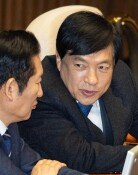FT Reverses Negative Stance on Korean Economy
FT Reverses Negative Stance on Korean Economy
Posted February. 10, 2010 07:16,
A readers contribution titled Id like to see the Financial Times a little more upbeat about S. Korea was carried by the British daily Feb. 3. The piece disputed the Financial Times claim on Jan. 28 that Samsung Electronics lack of innovation will undermine its profits over the long term.
Matthew Jackson of London said Samsung Electronics last year ranked second only to IBM by earning 3,611 patents in the U.S., and that while Japan Airlines went bankrupt, Incheon International Airport in Korea outperformed Japanese airports. He asked the newspaper to take a less incredulous stance on Korea.
A Korean government official said yesterday, Given that the FT included such comments, its view on Korea seems to have significantly changed.
The daily also carried an opinion piece in December last year by Aidan Foster-Carter, honorary senior research fellow in sociology and modern Korea at Leeds University of England. He said the British media must change their negative view on Korea.
The Financial Times has written articles downplaying the Korean economy several times, angering the Korean government. In the column The Ghosts of 1997-98 Return posted in August 2008, the writer hinted at another looming financial crisis based on Koreas foreign reserves and household debts.
In October 2008, the daily called Korea one of the countries to be most likely infected by the global financial crisis. It ran a one-page story with pessimistic views on the Korean economy, prompting Seoul to announce counterarguments.
Experts say the Financial Times has changed its view on Korea given that the country is seeing the fastest recovery among major economies.
The majority of foreign media that have been negative on the Korean economy began asking us from April last year whether the Korean economy had bottomed out, said Kim Yeong-min, foreign press spokesman of the Strategy and Finance Ministry.
As the Korean economy has recovered contrary to negative reports, the attitude of foreign media has significantly changed.
With the optimistic mood on Korea, the Financial Times ran the section Invest in South Korea in May last year.
One theory for the change in the dailys stance is the replacement of its Seoul correspondent, who would irk Seoul due to differing views over Lone Stars investment in Korea Exchange Bank.
The government also hired a spokesman specifically for foreign media and offered news briefings in English, and this raised the number of contacts with foreign correspondents.
In addition, high-ranking officials from economy-related ministries since last year have held regular meetings with foreign correspondents in Seoul to explain economic issues.
peacechaos@donga.com turtle@donga.com





![“잠만 자면 입이 바싹바싹”…잠들기 전에 이것 체크해야 [알쓸톡]](https://dimg.donga.com/c/138/175/90/1/wps/NEWS/IMAGE/2026/02/23/133404749.3.jpg)

